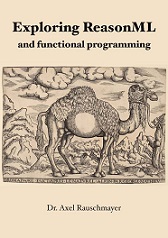
|
FreeComputerBooks.com
Links to Free Computer, Mathematics, Technical Books all over the World
|
|
- Title Exploring ReasonML and Functional Programming
- Author(s) Dr. Axel Rauschmayer
- Publisher: ReasonML Hub
- Hardcover/Paperback: 500 pages
- eBook: HTML
- Language: English
- ISBN-10: N/A
- ISBN-13: N/A
- Share This:

|
This book teaches the programming language ReasonML by Facebook. It is also an introduction to functional programming. Especially people familiar with C-style languages (Java, JavaScript, C#, etc.) will profit from ReasonML's familiar syntax.
In short, ReasonML is a new dialect of OCaml with a toolset that’s more suitable for Javascript developers. It was initiated by Facebook as a way to improve how front end developers write code by avoiding lots of bugs caused by Javascript not having a sound type system.
The target audience of this book is web developers who are somewhat familiar with ReactJS and who want to learn why ReasonML is the future of ReactJS.
- Hands on learning by building a real world app shell that includes client-side routing and more.
- Understand Reason’s ecosystem including BuckleScript and various npm workflows.
- Learn how Reason differs from TypeScript and Flow, and how to use it to make refactoring less stressful.
- Axel specializes in JavaScript and web development. He has been developing web applications since 1995. In 1999, he was technical manager at a German Internet startup that later expanded internationally. In 2006, he held his first talk on Ajax. In 2010, he received a Ph.D. in Informatics from the University of Munich.
- Functional Programming
- Caml and OCaml (Objective Caml) Programming
- ML and Standard ML (SML) Programming Language
- New and Miscellaneous Computer/Programming Languages
 Similar Books:
Similar Books:
-
 Object-Oriented vs. Functional Programming (R. Warburton)
Object-Oriented vs. Functional Programming (R. Warburton)
This book discusses similarities between these programming paradigms and points out that both FP and OOP are actually moving closer toward one another. One prominent example is the use of lambda expressions in Java and other OOP languages.
-
 Mostly Adequate Guide To Functional Programming
Mostly Adequate Guide To Functional Programming
This is a book on the functional paradigm in general. We'll use the world's most popular functional programming language: JavaScript. This makes it possible to practice and apply your acquired knowledge each day on real world programs.
-
 Functional Programming in Python (David Mertz)
Functional Programming in Python (David Mertz)
It describes ways to avoid Python's imperative-style flow control, the nuances of callable functions, how to work lazily with iterators, and the use of higher-order functions. He also lists several third-party Python libraries useful for functional programming.
-
 The Haskell School of Music - From Signals to Symphonies
The Haskell School of Music - From Signals to Symphonies
This book explores the fundamentals of computer music and functional programming through the Haskell. It explores common paradigms used in algorithmic music composition, such as stochastic generation, musical grammars, etc.
-
 Functional Programming in OCaml (Michael R. Clarkson, et al.)
Functional Programming in OCaml (Michael R. Clarkson, et al.)
This book is a multi-dimensional presentation of the OCaml language that combines an informal and intuitive approach to the language with a rigorous definition and a formal semantics of a large subset of the language, including ML.
-
 Writing Native Mobile Apps in a Functional Language Succinctly
Writing Native Mobile Apps in a Functional Language Succinctly
This book shows how you can use a customized functional language to build fully functional mobile apps. You will build off the skills you’ve already developed to begin creating applications that you can put to immediate use.
-
 Purely Functional Data Structures (Chris Okasaki)
Purely Functional Data Structures (Chris Okasaki)
This book describes data structures from the point of view of functional languages, with examples, and presents design techniques that allow programmers to develop their own functional data structures. All source code is given in Standard ML and Haskell.
-
 Type Theory and Functional Programming (Simon Thompson)
Type Theory and Functional Programming (Simon Thompson)
This book explores the role of Martin-Lof's constructive type theory in computer programming. The main focus of the book is how the theory can be successfully applied in practice.





